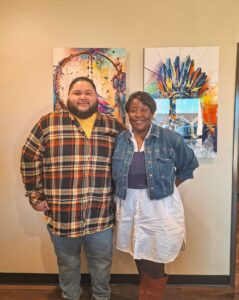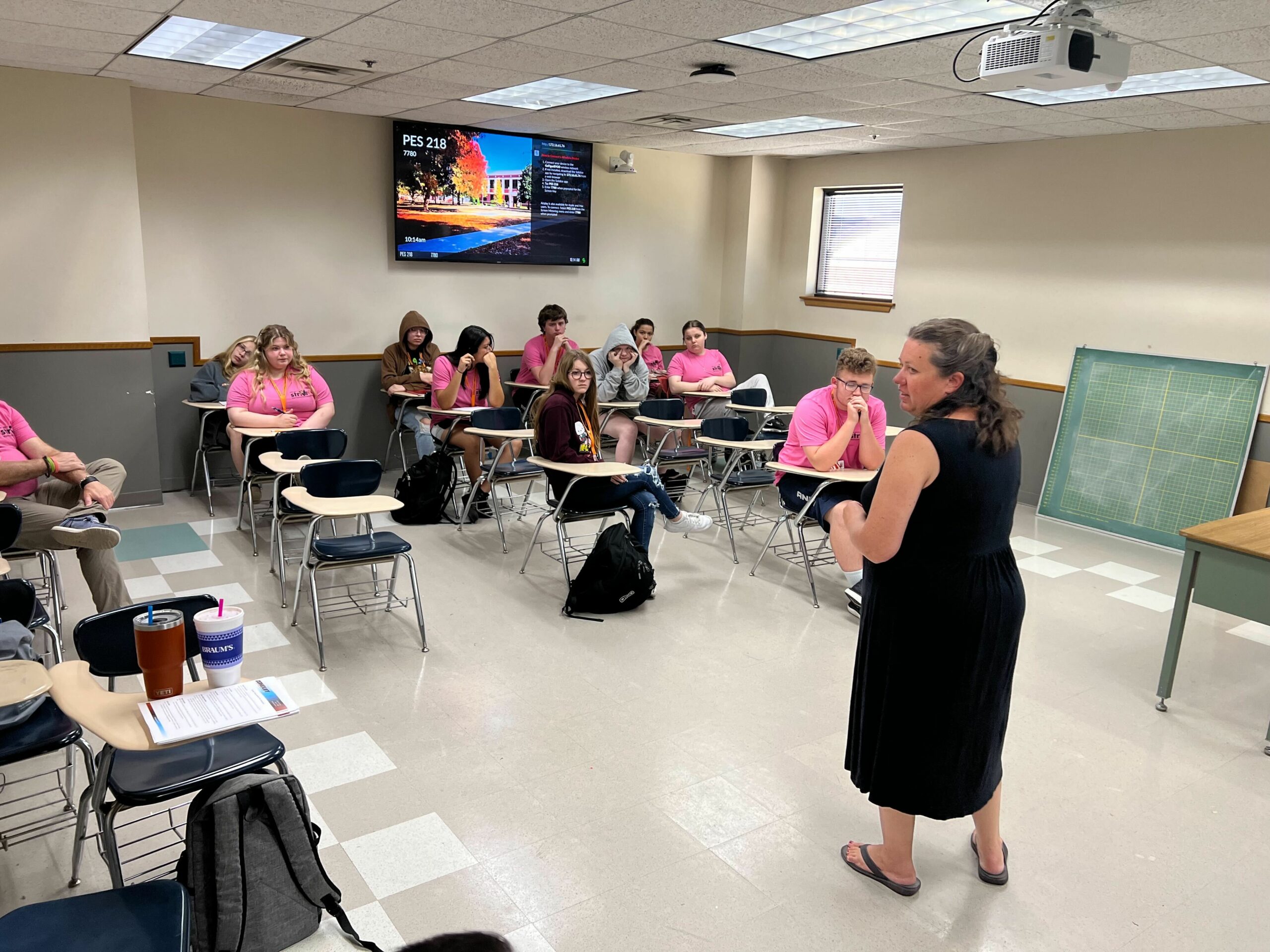
Education and Outreach: High School Entrepreneurship Efforts with the Conduit Initiative Staff
July 21, 2023 by Jessika Leatherbury
By: Sunnie Dawn Baker
 One of the main goals of the Startup Conduit Initiative for Southern Oklahoma is to support entrepreneurs, specifically technology entrepreneurs. However, with the goal of inspiring future entrepreneurs, our team wanted to focus on reaching out to high school students in our area. These students are digital natives, raised with technology enmeshed in every aspect of their lives. If we can give them information about entrepreneurship and encourage them to think entrepreneurially, they will create new technological innovations and startups in the future. As the Conduit Team started brainstorming on how best to reach these students, we decided the best course of action would be to develop a two-session workshop that we could pilot with high school students through the Upward Bound 2 program, hosted at East Central University.
One of the main goals of the Startup Conduit Initiative for Southern Oklahoma is to support entrepreneurs, specifically technology entrepreneurs. However, with the goal of inspiring future entrepreneurs, our team wanted to focus on reaching out to high school students in our area. These students are digital natives, raised with technology enmeshed in every aspect of their lives. If we can give them information about entrepreneurship and encourage them to think entrepreneurially, they will create new technological innovations and startups in the future. As the Conduit Team started brainstorming on how best to reach these students, we decided the best course of action would be to develop a two-session workshop that we could pilot with high school students through the Upward Bound 2 program, hosted at East Central University.
The Upward Bound program was originally designed as a part of Lyndon B. Johnson’s War on Poverty in 1964. The main intent was to provide opportunities and reduce barriers to low-income high school students and those who would become first generation college students. East Central University hosts three different high school Upward Bound programs: Upward Bound Math Science, Upward Bound, and Upward Bound 2. Each program is unique, though Upward Bound and Upward Bound 2 are the most similar, mainly focusing on different service areas for their students. While Upward Bound serves students from the regional communities of Vanoss, Byng, Wynnewood, Sasakwa, Crowder, and Stringtown, Upward Bound 2 serves students from the areas of Sulphur, Roff, Lexington, Wanette, Tupelo, Pittsburg, Savannah, and McAlester. As a part of the Upward Bound 2 curriculum, their director, Vence Johnson, teaches a financial literacy course that each student attends twice a week. In our discussions with Johnson, it was decided that this course would be an excellent opportunity to pilot our high school entrepreneurship curriculum.
Over the course of the project Matt Stephens, Jake Cantrell, and I were able to work with nineteen different high school students spread between two classes—nine in one and ten in the other. For the introductory session, Matt Stephens led a discussion about what entrepreneurship means, focusing primarily on the how they might think like entrepreneur, pushing them to see the world through this new lens in whatever career they take after high school.
I spoke with the students about identifying business ideas and opportunities, leading the students to consider problems that they face in their own lives and how they could formulate solutions that could turn into businesses. The students separated into small groups to discuss and brainstorm, bouncing ideas off one another, before sharing their ideas with the class. The students came up with several great ideas that would solve problems that either they face or that others that they know might face. Interestingly, the majority of the ideas also had some kind of technological component, likely because they are immersed in a world of technological possibilities.
Jake Cantrell introduced the students to the idea of an elevator pitch. Many were familiar with the concept because of the show Shark Tank, but none of them had constructed a business pitch. Cantrell, using an example of one of his own pitches, broke down the format into five easy steps for the students: problem statement, solution, target market, unique selling proposition, and a call to action. At the end of the class, we gave each team an assignment of coming back in two weeks with their own elevator pitch for a business idea.
When we returned two weeks later, the students were prepared to pitch and had a competition at the beginning of class, judged on their skill in hitting the five target points provided the previous session. The students took the assignment seriously and came prepared with their best pitch. After the competition, we had them apply different ideas and concepts to their proposed business idea. Stephens talked to the students about market research and customer discovery and we had the students get back into their groups to brainstorm what that would look like in their own particular scenarios. After this mini-breakout session, I spoke to the students about marketing and branding and then, once again, had them group up to discuss how they would go about this aspect of entrepreneurship, encouraging them to build on their ideas about market research and customer discovery. Finally, Cantrell talked about the importance of building a team, and finding your strengths and weaknesses as an entrepreneur and the importance of discovering where they might need help or guidance.
The entire experience was a success, with several students taking business cards with them at the end, and one even reaching out after the program was over to see how she might go about starting her entrepreneurial journey in the real world. Hailey, a junior from Sulphur, says, “I felt really inspired to make a business. It made me feel like I could do something that I didn’t think was possible.” The feedback from the students and their instructor was so positive that we decided to do the program once again, though this time with teenagers from the Youth Connect Club. Though the new students were younger than the Upward Bound students—leaning more towards middle school than high school—the discussions were similarly beneficial. It was interesting to see how these similar lessons can be applied to various age groups.
After piloting this program in person, the ultimate goal is to create a stand-alone entrepreneurship curriculum that we can provide to schools throughout our ten-county service area as a resource to educators. Most schools do not have the resources to offer their own course on entrepreneurship, but if we can provide a week-long module that they can use in their classrooms, perhaps that will further encourage these future entrepreneurs across the region.
Summing up the Conduit Initiative’s high school entrepreneurship outreach, Cantrell says, “engaging students in discussions about entrepreneurship not only ignites their creativity and critical thinking skills, but also opens up a world of possibilities, empowering them to shape their own future with limitless potential.” Whether or not these students become entrepreneurs, thinking like an entrepreneur provides a great set of benefits which can be applied to many aspects of their lives and careers. However, if they do want to start their own businesses, then we can help them begin that journey.
Sign up to receive more news from the Ada Jobs Foundation HERE!
Written by
Jessika Leatherbury
You may also interested in:

BUILDING FUTURES: WORK READY ADA CELEBRATES ITS FIRST YEAR
BY: CATHLENA SPENCER Just one year ago, Work Ready Ada, a new employment readiness program, was launched in partnership with Pontotoc Technology Center (PTC). The program, funded by Oklahoma Human
AI IN EDUCATION: A CONVERSATION WITH VINAYAK MITTY
BY: SUNNIE DAWN BAKER One of the areas in technology with the most potential for entrepreneurial growth is Artificial Intelligence (AI). AI is increasingly shaping every part of our lives,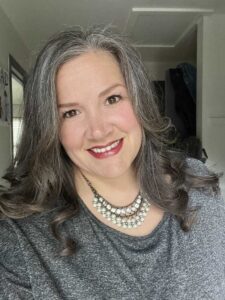
Adapt and Overcome: Allison Poe’s Recipe for Resilience and Growth
By: Sunnie Dawn Baker Allison Poe has always followed her feet. She waits for the signs to appear and, once she recognizes them, she travels that path, and has never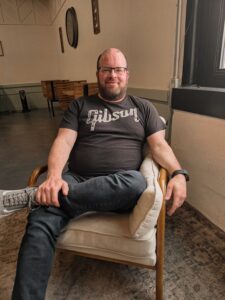
Jeff Warren: A Life in Sound, Vision, and Storytelling
By: Sunnie Dawn Baker When Jeff Warren got involved in the Houston music scene as a teenager, he had no clue where his path would lead. Now, nearly thirty years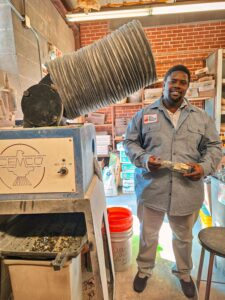
From Pitch to Progress: ECU's Glass Recycling Program Turns Waste into Opportunity
By: Sunnie Dawn Baker In 2018, Dr. Christine Pappas competed in Ada Jobs Foundation’s Big Pitch Competition by promoting grinding glass bottles into sand. She won the Big Pitch that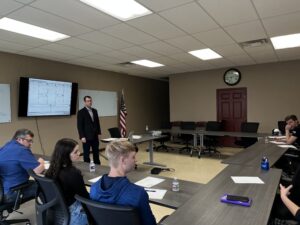
The Importance of Customer Discovery: Know Your Audience and Know Your Market
By: Sunnie Dawn Baker Entrepreneurs and small business owners must consider many factors to achieve success, with their target market being one of the most crucial. Sometimes, when people are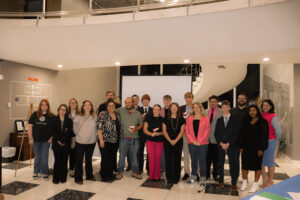
What Does Economic Development Do for You? The Significance of the Economic Multiplier
By: Sunnie Dawn Baker People often find the term “economic development” vague and confusing. Understanding how economic development works and benefits the community can be challenging. Though there are many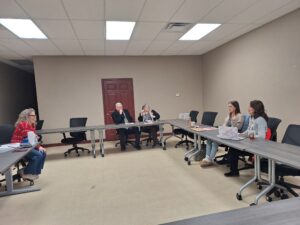
Helping Entrepreneurs One Workshop at a Time: Lauri Rowe and QuickBooks for Small Businesses
Entrepreneurs tend to be filled with passion and big ideas. They have found a solution to a problem they see in the world, and they barrel ahead, excited for their
Hunter Cook: Technology, Entrepreneurship, and the Written Word
By: Sunnie Dawn Baker Hunter Cook started writing when he was seven years old. At first, he wanted to write comic books, but then he realized he couldn’t draw. He